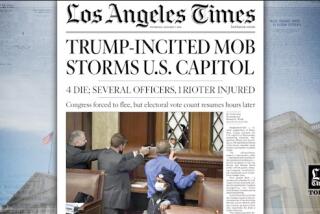Angry George Sees Hypocrisy in Iran-Contra Charges : Trial: Ex-CIA spy chief testifies that Congress knew of North’s secret operation and wanted to ‘set someone up’ to take responsibility.
- Share via
WASHINGTON — Former CIA spy chief Clair E. George erupted on the witness stand at his trial Thursday, charging that a hypocritical “Congress wanted to set someone up” to take responsibility for the Iran-Contra arms for hostages deal “and I walked right in.”
George, charged with obstructing Congress and lying to it, bitterly criticized several members of the same House and Senate committees he is accused of deceiving. These members, he said during the second day of cross-examination, already knew that former White House aide Oliver L. North was running a secret supply network when they asked George about the flights to Nicaragua in October, 1986.
“Not one of those guys had the guts to ask the question they knew the answer to--what about Ollie North,” George shouted. “They were waiting for me to say the wrong thing. Goddamn it, that’s hypocrisy.”
George is charged with perjury, obstruction and making false statements in connection with official inquiries that took place as the Iran-Contra scandal began to unravel.
During six hours of cross examination, George also accused chief prosecutor Craig A. Gillen of deceiving him into believing he was only a witness in the investigation. But U.S. District Judge Royce C. Lamberth defused that charge, telling George he had no right to be informed he was a subject of the independent counsel’s probe.
The judge gently but repeatedly instructed George to let Gillen finish his questions before launching into statements that seemed unresponsive or posed questions of his own.
In his accusations against Congress, George mentioned by name two members of panels before which he appeared--Sen. John Kerry (D-Mass.) and former Sen. Thomas F. Eagleton (D-Mo.). Both senators testified earlier that their inquiries were thwarted by George’s failure to relate details he allegedly knew about resupplying the Contras and about a key figure in the arms sales to Iran.
George also contended that Rep. Lee H. Hamilton (D-Ind.), chairman of the House Intelligence Committee, had approved “mixed” loads of supplies for the Contras--combining humanitarian supplies with arms provided by private parties.
For most of the day’s testimony, George seldom looked at the jury, instead following Gillen who used blowups of CIA cables to challenge George’s version of events, and sometimes looking toward his wife, Mary, and former CIA colleagues who filled the front two spectators’ rows. When his rage took over, George pounded the witness stand and leaned forward to grab the microphone in a tight grasp.
The cross-examination did produce new information about the source of a bit of dark humor surrounding “Max Gomez,” the alias for Felix Rodriguez, a former CIA operative who worked with North in El Salvador on flying supplies to the Contras after Congress barred the government from taking part in the effort. After a resupply plane was shot down by Sandinista forces over Nicaragua on Oct. 5, 1986, “Gomez” was identified as the person who ran the program.
At a time when Congress was pressing for details about the resupply flights, George and other CIA officials allegedly wore buttons around the agency that had such slogans as “I Am Max Gomez” and “Who is Max Gomez.” Gillen’s opening statement and testimony by Alan D. Fiers, former chief of the CIA’s Central American task force, had indicated the slogan buttons were the product of CIA humor.
Asked by Gillen about the buttons, George said he obtained them from Donald P. Gregg, a longtime CIA officer who was then-Vice President Bush’s national security adviser. He referred to them as “funny items from the White House.”
George is charged with four counts of making false statements and obstruction for telling Senate and House panels that he had no detailed CIA knowledge about Rodriguez.
For much of the day’s cross-examination, George argued with Gillen over the prosecutor’s choice of words. In a typical exchange, Gillen asked George why he had told Senate and House panels that he did not know retired Air Force Maj. Gen. Richard V. Secord, who took part in both the arms-for-hostages deal with Iran and the Contra resupply effort, even though George had met Secord in the White House situation room.
“I don’t know the man,” George insisted, distinguishing between knowing and meeting a person. “I don’t know you, Mr. Gillen, but I sure have met you,” George said, spitting out his words.
Actually, George added, in other testimony, “I told them I hadn’t laid eyes on him. That’s worse.”
Accusing Gillen of “nit-picking me to death,” George bristled at the prosecutor’s emphasis that he had been testifying “under oath” before House and Senate panels and the federal grand jury.
“By God, a man does the best he can under oath, and if it doesn’t work out perfectly, we’ll all be condemned,” George said.
He will resume testifying today.
More to Read
Sign up for Essential California
The most important California stories and recommendations in your inbox every morning.
You may occasionally receive promotional content from the Los Angeles Times.













